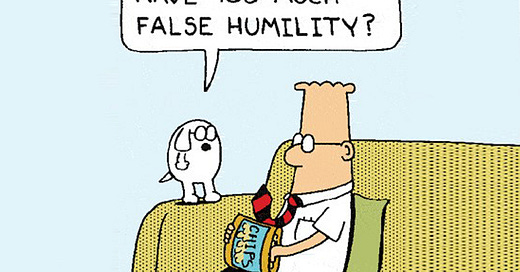Can someone be too virtuous?
Are virtues subject to diminishing marginal returns? Yes they are!
A couple weeks ago, I wrote a piece for Uncommon Wisdom arguing that our lives were subject to the economic law of diminishing marginal returns: everything else being equal, the first unit of something is worth more than the next, which is worth more than the next unit, and so forth and so on. Here is an example I gave,
Consider an example: Agent Scully is an FBI agent who values her side arm to deal with trouble. She would even value a backup gun, just in case she loses her primary weapon—a common tactic used by law enforcement. Perhaps she would value a third gun, to keep at home for protection when she isn’t officially packing. Perhaps she would value a forth gun as a personal backup. But even as a law enforcement officer, Scully only values guns to a point. By the time we get to gun six through ten, guns would have little to no value. Add even more guns, and they suddenly acquire disvalue: they would get in the way, pose a safety issue, and cause many other problems.
Stuff can have value to us, but only to a point. After that it loses value until it comes to have negative value. Some philosophers objected that the law of diminishing marginal returns appealed to an economic theory where value scales with scarcity. There are other kinds of values, however, like intrinsic value, where the value of something doesn’t scale with scarcity. Take the virtue of patience: to the extent patience is an intrinsic value—something that has value in and of itself—then it would be odd to think that it would be subject to the law of diminishing marginal returns.
And yet, even patient is subject to that economic law. How? Simple. Consider a pair of virtues: patience and courage. Presumably developing these virtues would require time and practice, and perhaps designed an environment where cultivating such virtues is made easier. But that time and practice is, at least sometimes, mutually exclusive: many of the tasks one would need to regularly perform to develop patience would be different from the tasks one would need to regularly perform to develop courage. This isn’t always so—some tasks would develop aspects of both virtues, but many of them wouldn’t. But often enough, to develop one virtue, one must neglect the development of others.
Here the law of diminishing returns applies. You and I are finite moral agents with limited time and cognitive abilities. And to the extent that one has a high level of patience, further developing that patience may come at the expense of developing courage, at least sometimes. So if one were patient enough, but hardly courageous at all, then one could be too patient if it came at the expense of developing courage. In such a case, as one became increasingly patient, it would be less and less value when developed at the expense of other virtues. So, even with respect to virtues, the law of diminishing marginal returns applies, not to the intrinsic value itself, but how much someone values that virtue relative to other virtues (or doing stuff unrelated to the moral domain). As the philosopher, Susan Wolf, warned about morality,
For the moral virtues, given that they are […] apt to crowd out the nonmoral virtues, as well as many of the interests and personal characteristics that we generally think contribute to a healthy, well-rounded, richly developed character. In other words, if the moral saint is devoting all his time to feeding the hungry or healing the sick or raising money for Oxfam, then necessarily he is not reading Victorian novels, playing the oboe, or improving his backhand.




